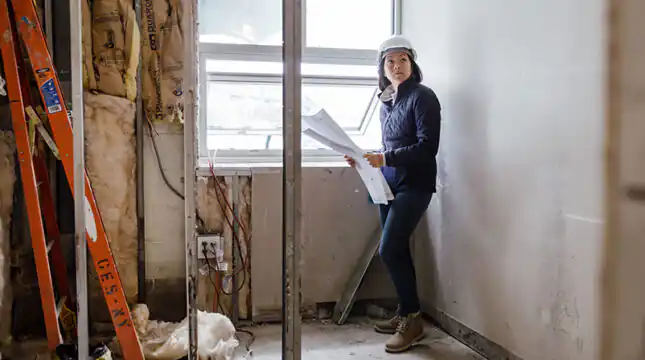Wisconsin dwelling contractor requirements
There are two types of Wisconsin general contractor license requirements.
First, anyone who intends to build, improve, or alter a one- or two-family dwelling or accessory building must have a dwelling contractor qualifier license (or work under someone who does).
You will also need a dwelling contractor license if you own a construction business. The license is held under the business name and does not require continuing education. However, it must be renewed yearly.
How to get a Wisconsin general contractor license
Getting a Wisconsin dwelling contractor license requires meeting state-level requirements through the DSPS. Here’s a step-by-step guide to help you through the process:
Step 1: Complete your pre-license education
- Take the Wisconsin Dwelling Contractor Qualifier Certification Course.
- The course includes 12 hours of approved pre-license education and is required before you can apply.
Step 2: Create your DSPS LicensE account
- Register for an account with the LicensE system (previously the eSLA system).
- While optional, using the LicensE portal makes it easier to submit your application, upload documents, and pay fees online.
Step 3: Prepare your application documents
Send in your qualifier application with the necessary information, fees, and proof of your qualifier course. You will need:
- Business FEIN number
- Business name and title of representative
- U.S. citizen or proof of lawful presence
- Proof of workers’ compensation insurance (if you have employees)
- Proof of financial responsibility, such as a $25,000 bond or liability policy
- Exam certification
- Application fees
Step 4: Submit your application
- File your application with DSPS either online via LicensE or by mail.
- Double-check that all information is accurate and complete to avoid delays.
Step 5: Wait for DSPS approval
- Wait for the DSPS to review, process and approve your application.
- Once approved, you’ll receive your official Wisconsin dwelling contractor license.
Step 6: Check for local requirements
- Wisconsin issues dwelling contractor licenses at the state level, but certain cities or counties may require additional permits or registrations.
- Before starting work, verify whether your project location has local contractor licensing rules.
After completing these steps, you’ll be ready to legally operate as a Wisconsin general contractor (dwelling contractor).
Insurance for Wisconsin dwelling contractors
Wisconsin general contractors are required to maintain minimum liability insurance coverage to fulfill the financial responsibility requirement of their license. Here are some common types of Wisconsin business insurance contractors usually consider having.
General Liability insurance
Wisconsin requires dwelling contractors to carry $250,000 in general liability insurance to ensure proof of financial responsibility. It helps protect your business from accidents, injuries, or property damage that may occur during the course of business as a dwelling contractor.
Learn more about General Liability for contractors.
Workers’ Compensation insurance
Dwelling contractors must provide workers’ compensation insurance to their employees in case of job-related injuries or illnesses. Generally, workers’ compensation insurance helps cover medical expenses, rehabilitation costs and lost wages.
Learn more about Workers’ Comp for contractors.
Tools and Equipment insurance
Tools and equipment insurance is an essential coverage for dwelling contractors. It helps cover loss or damage for hand tools, power tools and other equipment that a contractor uses regularly.
Commercial Auto insurance
Commercial auto insurance can help protect the vehicles you use for business. A policy can safeguard against accidents or damage you experience while on the job.
Commercial Property insurance
Commercial property insurance can keep your business running smoothly. It helps protect against potential losses due to property damage, theft and other unexpected events.
Wisconsin dwelling contractor license renewal requirements
Wisconsin dwelling contractor license renewal requires submitting the $25 renewal fee using the state’s LicensE portal. This license doesn’t require continuing education, but it must be renewed annually.
The dwelling contractor qualifier license is valid for two years. It requires completing 12 hours of approved continuing education, providing evidence of completion, and paying the $30 fee.
If you’re restarting a general contracting business and your license expired more than a year ago, you can reinstate it by submitting an application and supporting documentation, along with a $200 fee.
Bond requirements for Wisconsin dwelling contractors
Proof of financial responsibility is necessary to be a Wisconsin dwelling contractor. You can either get general contractor liability insurance or you can file a bond of at least $25,000. The state will issue you a restricted certification if your bond is less than that.
Local requirements for Wisconsin contractors
While the state of Wisconsin issues dwelling contractor licenses at the state level, some cities may have additional requirements.
Milwaukee
In Milwaukee, contractors must hold a City Home Improvement Contractor License in addition to state dwelling contractor certification.
The city’s license application requires a certificate of insurance, a performance bond and you must be fingerprinted by the Milwaukee Police Department. You can get an application from the City Clerk’s office during regular business hours. The license fee is $225.
Madison
Madison does not require a separate license from state requirements. However, you may need to verify whether your construction project or trade work has additional permit or registration requirements.. You may also need to file a request with the city if you’re a plumber or need to install or modify a water service.
Green Bay
Green Bay does not currently require a separate city general contractor license beyond state requirements for most work. However, contractors in Green Bay must obtain building permits for residential and commercial work.
For specialty work, such as electrical, plumbing or HVAC, the city follows state licensing rules. Contractors must obtain a specialty permit when needed.






